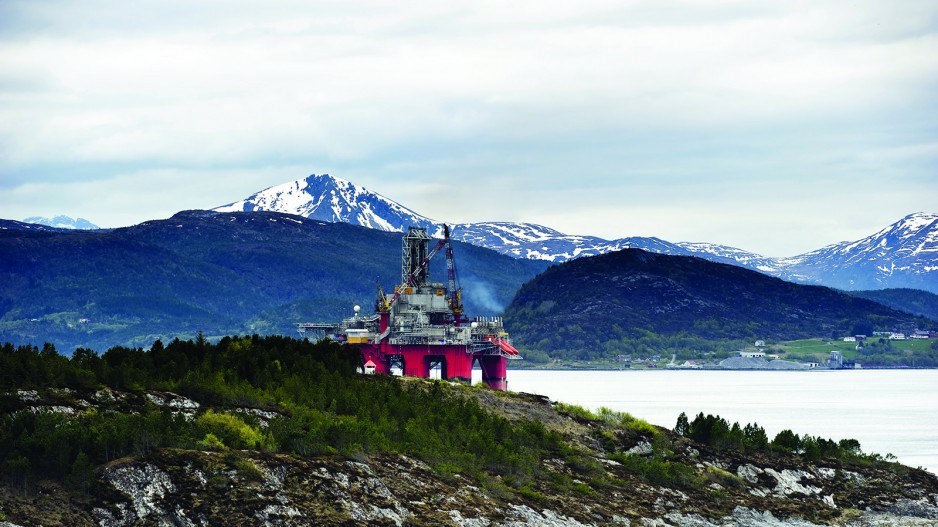At first blush, Norway’s decision to shed billions of dollars worth of oil and gas holdings might sound like a big win for the fossil fuel divestment movement.
And it might smack of hypocrisy.
After all, Norway’s $1 trillion government pension fund – the largest in the world – is also known as the “oil fund,” since it was built on oil revenue. Norway is Europe’s second-largest oil producer and exporter, after Russia.
But Norwegian pension funds are now bowing to pressure from the divestment movement and shedding at least some of their oil and gas investments. So are insurance companies.
AXIS Capital Holdings Ltd. (NYSE:AXS) announced last week that it will no longer insure new oilsands projects or pipelines associated with the oilsands.
Four Canadian oilsands producers have been targeted for divestment by Norway’s KLP pension fund: Suncor Energy (TSX:SU), Cenovus Energy (TSX:CEV), Imperial Oil Ltd. (TSX:IMO) and Husky Energy Inc. (TSX:HSE).
It’s not the full-on divestment that organizations like 350.org have been pushing for, however. The KLP fund is only punting companies that are primarily in oil and gas exploration and production, especially in the area of oilsands.
Norway’s government pension fund and the KLP fund will keep their investments in integrated majors like Exxon Mobil Corp. (NYSE:XOM) and Royal Dutch Shell and, of course, Norway’s own Equinor ASA (Statoil). The KLP fund also still contains a number of Canadian oil and gas producers.
To date, most institutional investors – big banks, pension funds, university endowments – have rejected or deferred divestment proposals, and often cite fiduciary duty to their clients. After all, divesting from a profitable sector like oil and gas could hurt pensioners and universities more than oil companies.
There are also serious questions about whether divestment will actually have any serious impact on greenhouse gas emissions. Microsoft founder Bill Gates – who has invested heavily in sustainability – doesn’t seem to think it will.
“Divestment, to date, probably has reduced about zero tonnes of emissions,” he recently told the Financial Times.
For every pension fund or university endowment that sells off its oil and gas stocks and bonds, some less virtuous fund manager will see a potential bargain and snap them up. As long as there is a demand for oil, there will be profits to be made from it, and some investor somewhere will put money into it.
The $75 million in Cenovus shares that Norway’s KLP pension is selling represents only 0.66% of the company’s total market cap, something that could be made up in a single day of trading.
“The decision by KLP pension fund to divest its shares in our company will have minimal impact on us,” Grady Semmens, a spokesperson for Cenovus, told Business in Vancouver in an email.
It could become a problem, however, if the divestment movement gains serious momentum. The oil and gas sector in the U.S. and Canada has already seen a decline in investment capital in the last few years, said Jackie Forrest, senior director at ARC Energy Research Institute.
“I think the concern is that there are limited sources of capital, and as more groups divest of the oil and gas industry, or certain companies, it just makes capital more scarce and hard to get,” she said. “So, yeah there’s a concern for sure.”
Wal van Lierop, founder of Chrysalix Venture Capital, thinks the divestment movement could pose a real threat to the Canadian oil industry, especially if interest rates ever go up. The issue with Alberta’s oilsands isn’t just its carbon intensity – it’s also its high costs.
Right now, low interest rates mean it is still relatively easy to finance projects, he said. But a combination of high interest rates and divestment could begin to put a serious squeeze on the Canadian oil and gas industry.
“I think it [divestment] will have a significant impact in Canada,” he said.
He points out the industry itself has made its own divestments, with majors like Royal Dutch Shell and ConocoPhillips (NYSE:COP) selling off their Alberta oilsands assets.
“Isn’t it a canary in the coal mine that most of the internationals have, in the meantime, left?”
Van Lierop added there is a danger that natural gas and liquefied natural gas – something he thinks is a necessary bridge to decarbonization – could get also caught up in the divestment movement.
Even if it works, however, the divestment movement might have a leakage problem. Divestment could indeed end up starving some oil producers of capital in North America and Europe, but that won’t necessarily dry up the world’s thirst for oil.
Stated-owned oil companies in Saudi Arabia, Russia, China and Iran that don’t rely on public markets for capital might benefit at the expense of producers in North America and Europe.
“In our view, all it will do is shift more supply to come from other places in the world, like the Middle East or Russia,” Forrest said. “The environmental effects of that oil may not be any better, or may be even worse.”
It may be that engagement, not disengagement, is a more effective tool for getting the companies with the biggest carbon footprints to voluntarily shrink those footprints.
Climate Action 100 is one example. Led by institutional investors, it engages with some of the world’s biggest companies to adopt corporate climate action plans.
To date, three oil majors – BP Plc, Royal Dutch Shell and Equinor ASA– and one mining major – Glencore Plc – have signed agreements to voluntarily reduce their carbon footprints. Shell, for example, has committed to cutting its carbon footprint by 20% by 2025, and 50% by 2050.
See companion piece on socially responsible and impact investing.




